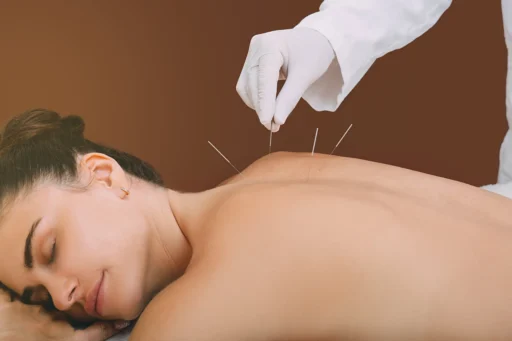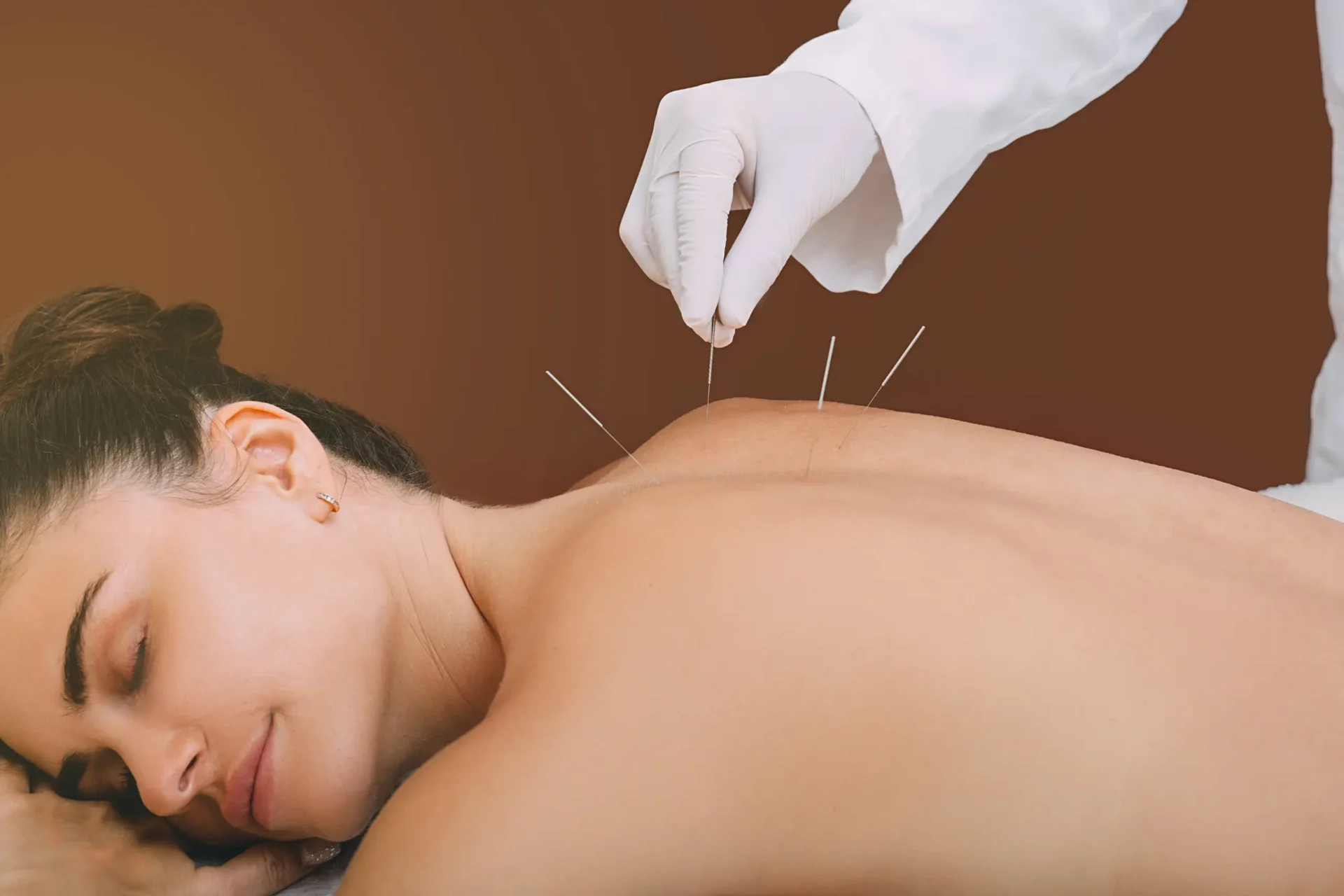Acupuncture, a cornerstone of Traditional Chinese Medicine (TCM), has been practiced for over 2,500 years. It involves inserting fine needles into specific points on the body to balance the flow of energy, or “qi.” Modern research has increasingly validated its efficacy, leading to its integration into mainstream healthcare systems worldwide.
Top 10 Benefits of Acupuncture
Acupuncture is an ancient healing practice rooted in Traditional Chinese Medicine that involves inserting thin needles into specific points on the body. Today, it’s widely used across the world for its proven ability to relieve pain, improve overall wellness, and support physical and emotional balance. Below are the top 10 benefits that make acupuncture a powerful tool for healing and prevention.
1. Effective Pain Management
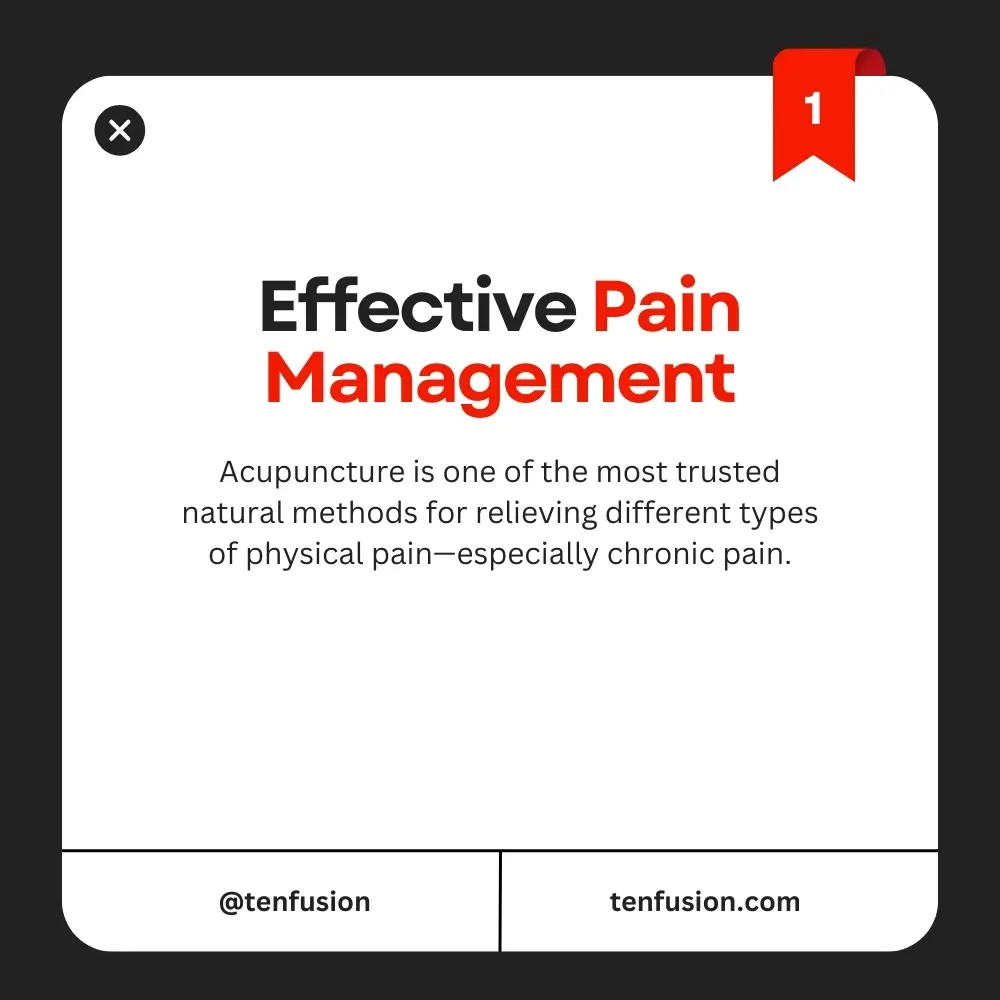
Acupuncture is one of the most trusted natural methods for relieving different types of physical pain—especially chronic pain.
How It Works:
When acupuncture needles are inserted at targeted points, they activate nerve endings that communicate with the brain and spinal cord. This triggers the release of endorphins (natural pain-relieving chemicals), and serotonin, which helps regulate pain perception. Additionally, acupuncture improves blood flow to affected areas, accelerating the healing of tissues and reducing inflammation.
Real-World Use:
It’s often used for:
- Lower back pain
- Neck and shoulder tension
- Arthritis (especially in knees and hands)
- Migraines and tension headaches
- Post-surgery pain or dental pain
Doctors frequently recommend acupuncture as a complement to conventional treatments for chronic pain, especially when medications are ineffective or cause side effects.
2. Stress Reduction and Mental Clarity
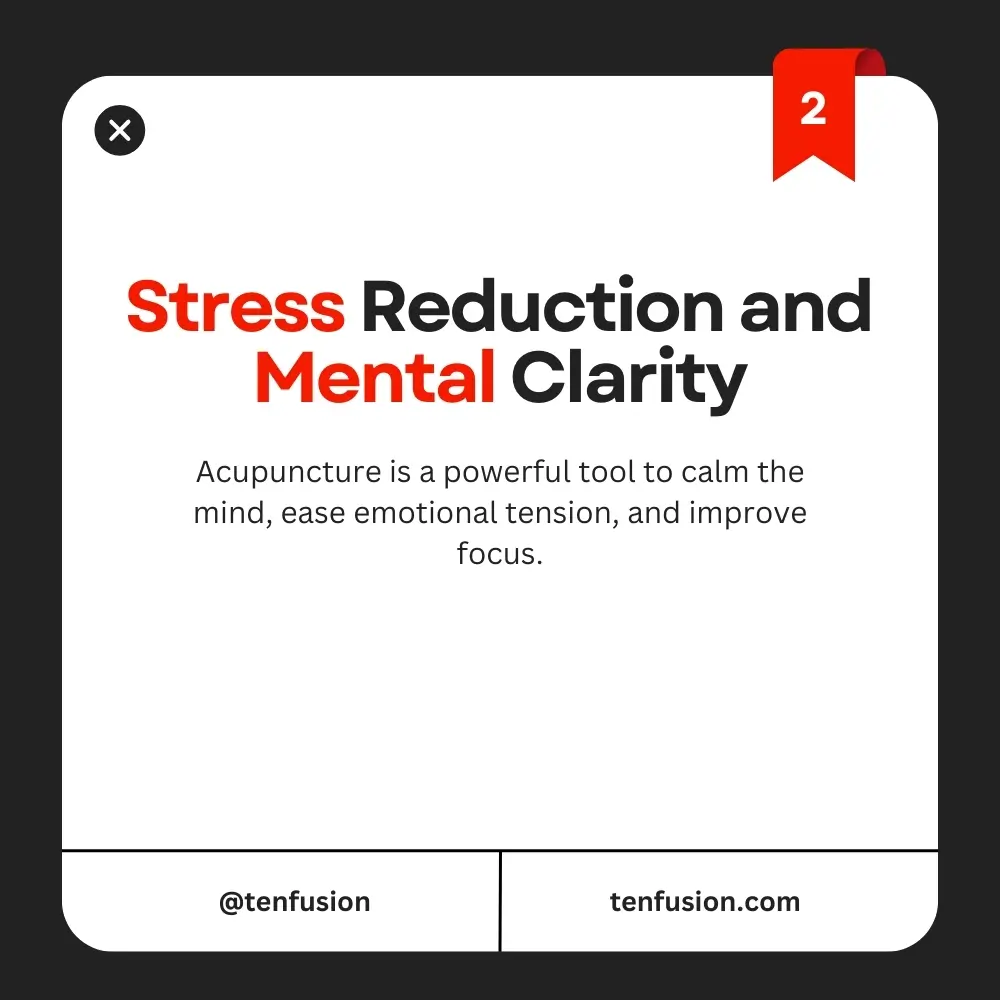
Acupuncture is a powerful tool to calm the mind, ease emotional tension, and improve focus.
How It Works:
Stress causes the body to enter a constant “fight or flight” state, raising levels of cortisol—a hormone that can damage both physical and mental health over time. Acupuncture activates the parasympathetic nervous system, which promotes relaxation and a sense of calm.
It also helps regulate mood-related chemicals like dopamine and serotonin, improving mental clarity, emotional balance, and resilience to daily stressors.
Real-World Use:
Patients often report feeling “mentally lighter” or more “centered” after acupuncture sessions. It’s widely used for:
- Anxiety
- Panic attacks
- Burnout
- Brain fog and trouble concentrating
- Emotional imbalances
3. Improved Sleep Quality
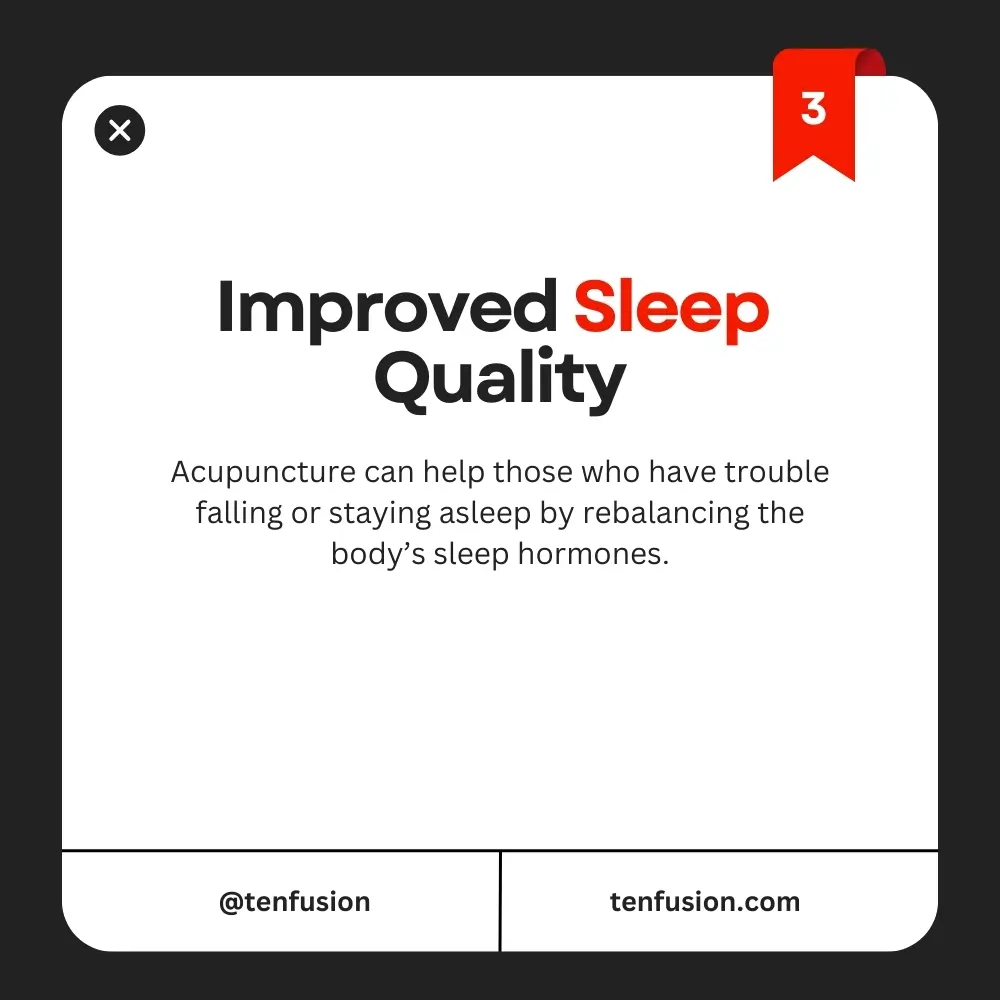
Acupuncture can help those who have trouble falling or staying asleep by rebalancing the body’s sleep hormones.
How It Works:
It influences the brain to produce melatonin, the hormone responsible for regulating the sleep-wake cycle. This helps the body shift naturally into a relaxed, sleep-ready state. Additionally, by reducing stress and calming the nervous system, acupuncture helps prevent insomnia caused by anxiety or chronic pain.
Real-World Use:
Acupuncture is commonly used to treat:
- Insomnia
- Night waking
- Sleep disturbances due to menopause or aging
- Poor sleep related to stress or PTSD
Many people experience better quality sleep even after just a few sessions.
4. Enhanced Immune Function
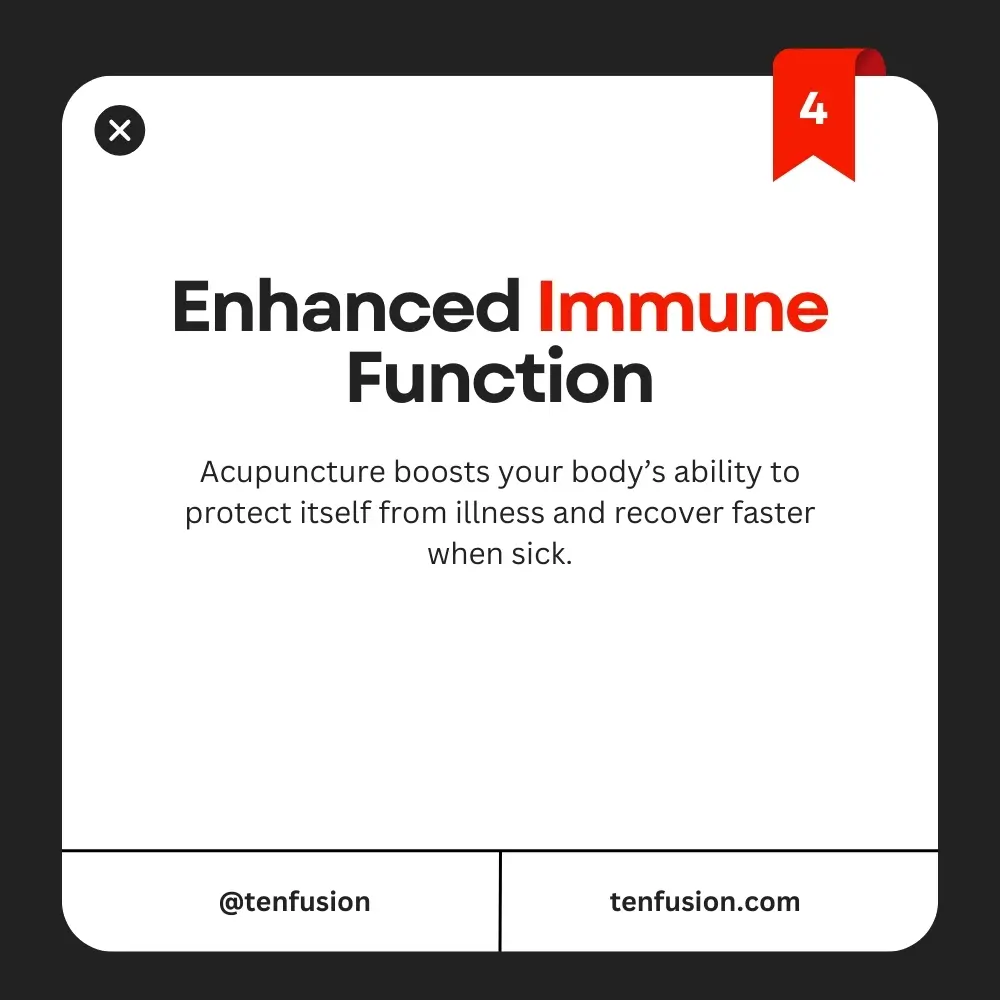
Acupuncture boosts your body’s ability to protect itself from illness and recover faster when sick.
How It Works:
Stimulating certain acupuncture points helps regulate immune responses and increases the activity of white blood cells—the body’s natural defense system. It also helps reduce chronic low-grade inflammation, which can weaken the immune system over time.
Real-World Use:
People use acupuncture to:
- Prevent colds and flu
- Reduce frequency of infections
- Strengthen immunity after illness or chemotherapy
- Manage autoimmune disorders
Acupuncture is especially popular during seasonal transitions, when the body is more vulnerable to viruses.
5. Digestive Health Support
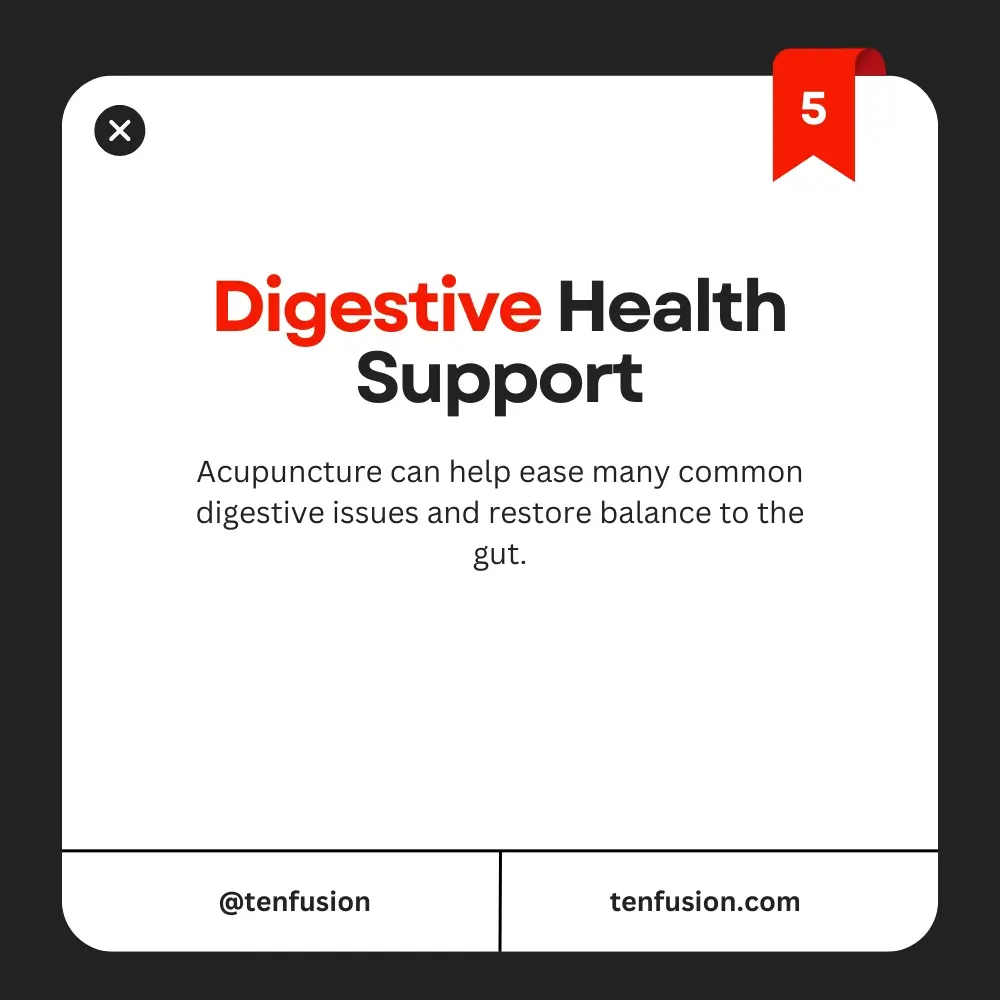
Acupuncture can help ease many common digestive issues and restore balance to the gut.
How It Works:
By stimulating nerves that control digestion, acupuncture enhances gut motility (how food moves through the digestive tract), balances stomach acid levels, and supports the production of digestive enzymes. It also reduces inflammation in the gastrointestinal system.
From a Traditional Chinese Medicine (TCM) perspective, it strengthens the energy (“qi”) of the spleen and stomach, which are seen as central to good digestion.
Real-World Use:
It’s often used to manage:
- Irritable Bowel Syndrome (IBS)
- Bloating and gas
- Constipation or diarrhea
- Acid reflux or heartburn
- Food intolerances
It offers a natural and holistic way to restore harmony in the digestive system without medications.
6. Allergy Relief
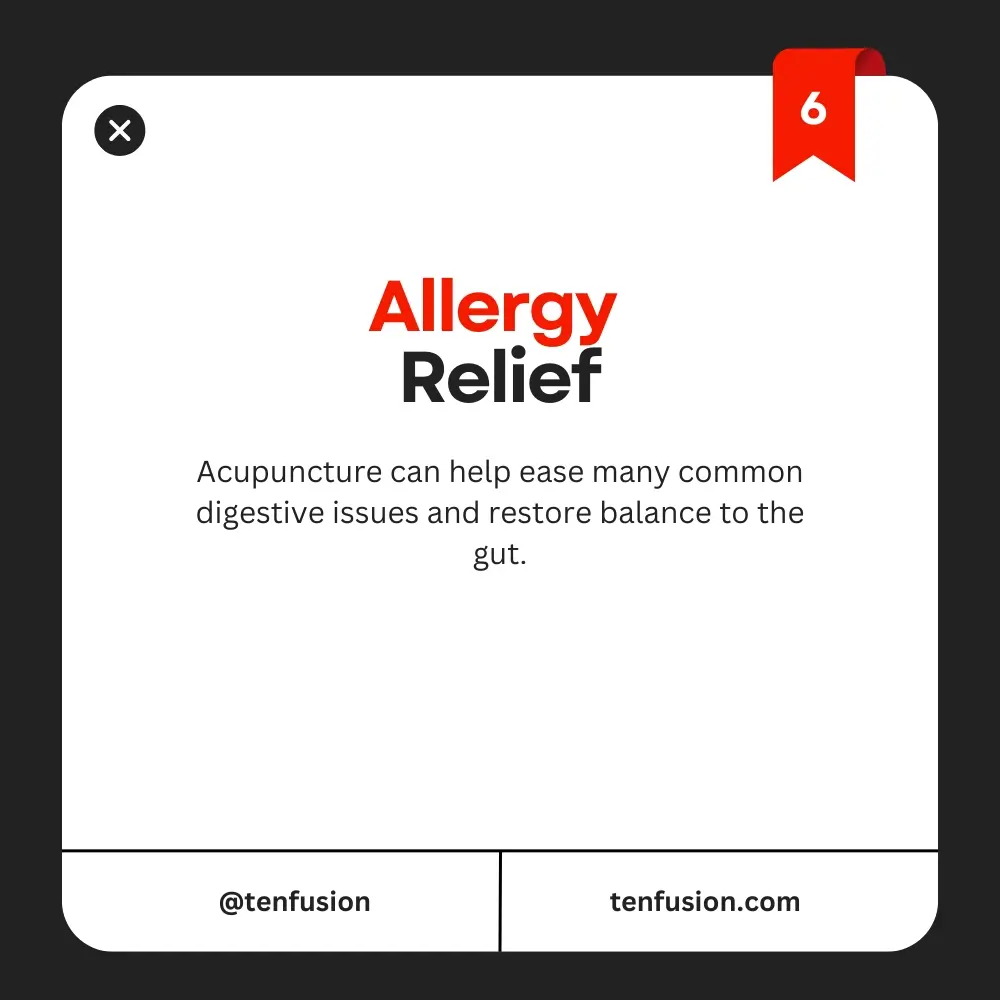
Acupuncture can lessen the severity and frequency of allergic reactions, especially seasonal allergies and hay fever.
How It Works:
Allergies occur when the immune system overreacts to harmless substances like pollen or dust. Acupuncture helps modulate the immune response by calming overactive cells and reducing the release of histamines—chemicals responsible for allergy symptoms like itching, sneezing, watery eyes, and congestion.
It also strengthens your overall immune system and reduces inflammation in the respiratory tract, making your body less reactive to environmental triggers.
Real-World Use:
Commonly used for:
- Seasonal allergic rhinitis
- Food sensitivities
- Skin allergies like eczema or hives
- Sinus pressure and chronic nasal congestion
Patients often experience less dependence on antihistamines after regular treatments.
7. Hormonal Balance and Fertility Enhancement
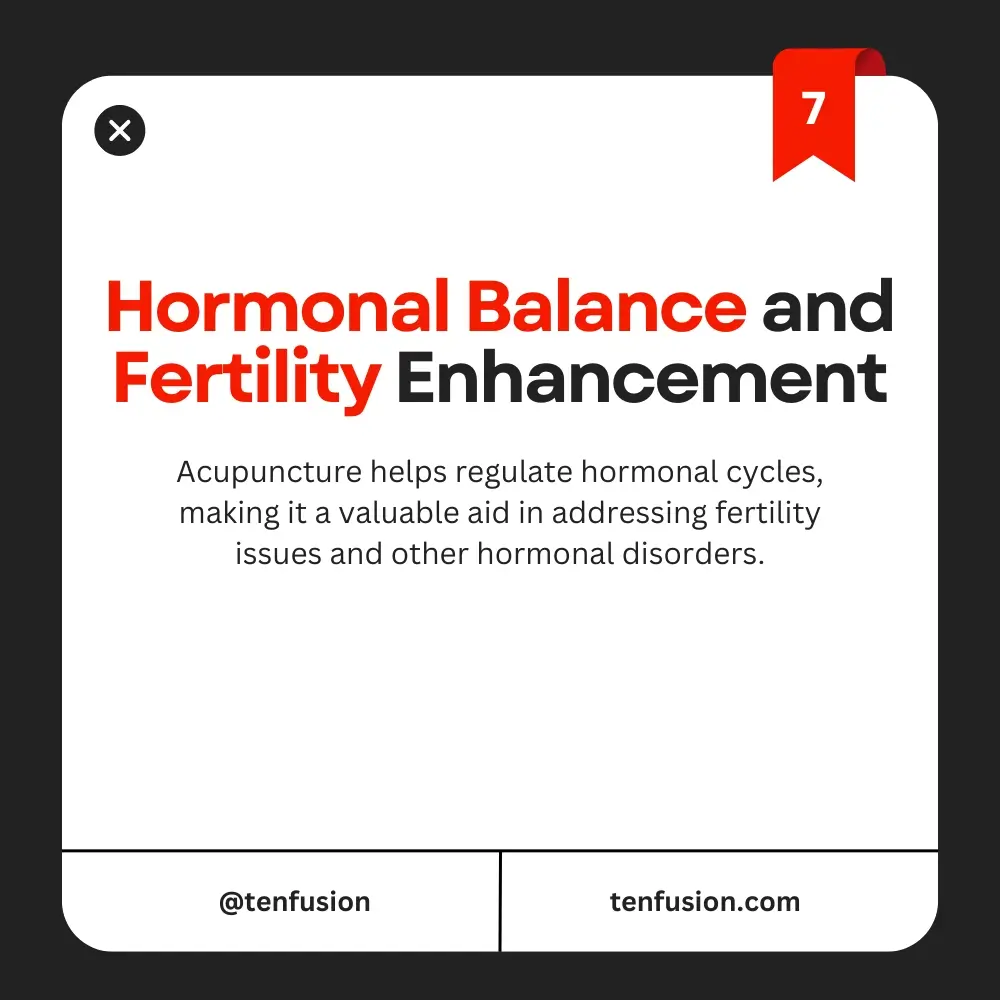
Acupuncture helps regulate hormonal cycles, making it a valuable aid in addressing fertility issues and other hormonal disorders.
How It Works:
It targets the hypothalamus-pituitary-ovarian (HPO) axis, which controls the production of reproductive hormones like estrogen, progesterone, and luteinizing hormone. By improving blood circulation to the ovaries and uterus, acupuncture supports healthy ovulation and uterine lining, increasing the chances of conception.
For men, it can also improve sperm quality and testosterone levels.
Real-World Use:
Acupuncture is widely used to support:
- Natural conception
- IVF and IUI treatments
- Polycystic Ovary Syndrome (PCOS)
- Irregular menstrual cycles
- Menopause symptoms
Many fertility clinics recommend acupuncture as a complementary therapy.
8. Mood Enhancement and Depression Alleviation
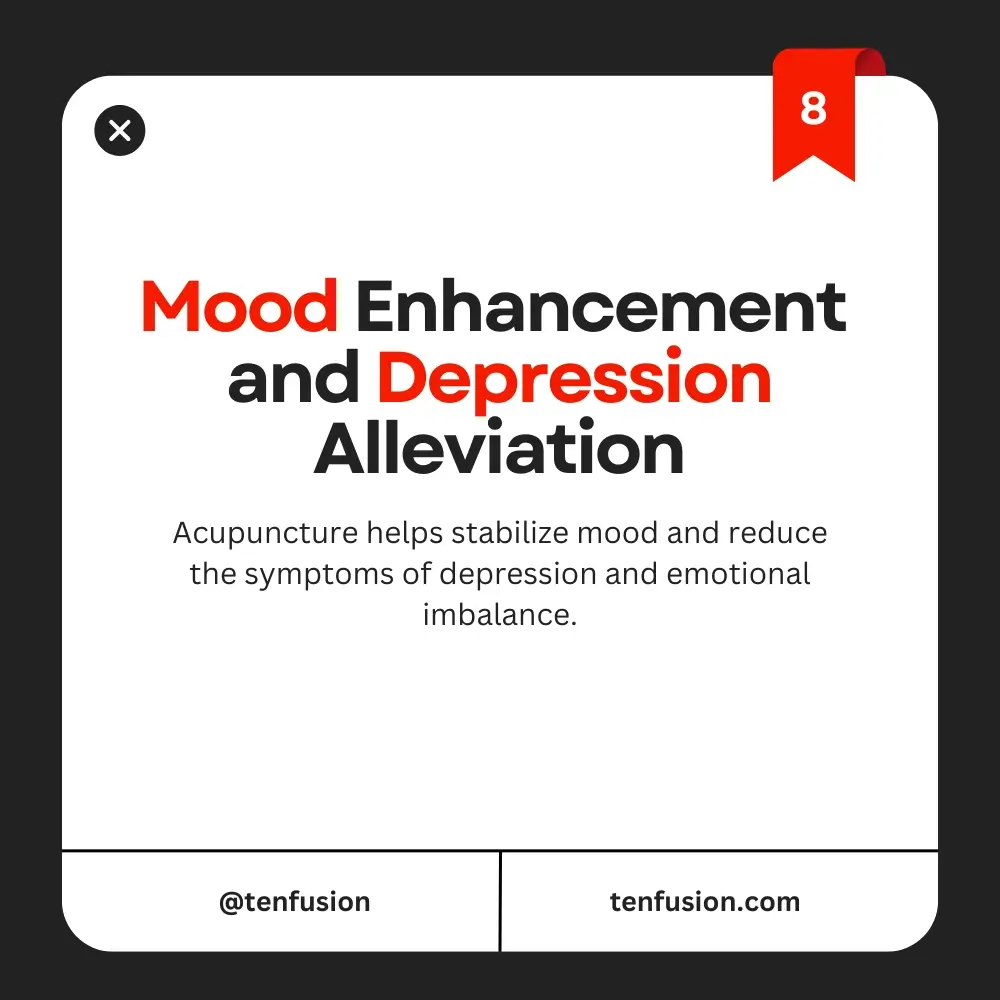
Acupuncture helps stabilize mood and reduce the symptoms of depression and emotional imbalance.
How It Works:
By stimulating certain points on the body, acupuncture influences the central nervous system to release mood-regulating neurotransmitters like serotonin, dopamine, and norepinephrine. These chemicals are essential for emotional stability and a sense of well-being.
It also helps rebalance the energy pathways (or “meridians”) that, in traditional Chinese medicine, are associated with emotional states.
Real-World Use:
Used to treat:
- Mild to moderate depression
- Mood swings
- PMS and postpartum depression
- Anxiety linked with depression
- Low energy or motivation
Acupuncture is often combined with talk therapy or medication for comprehensive care.
9. Cognitive Function Improvement
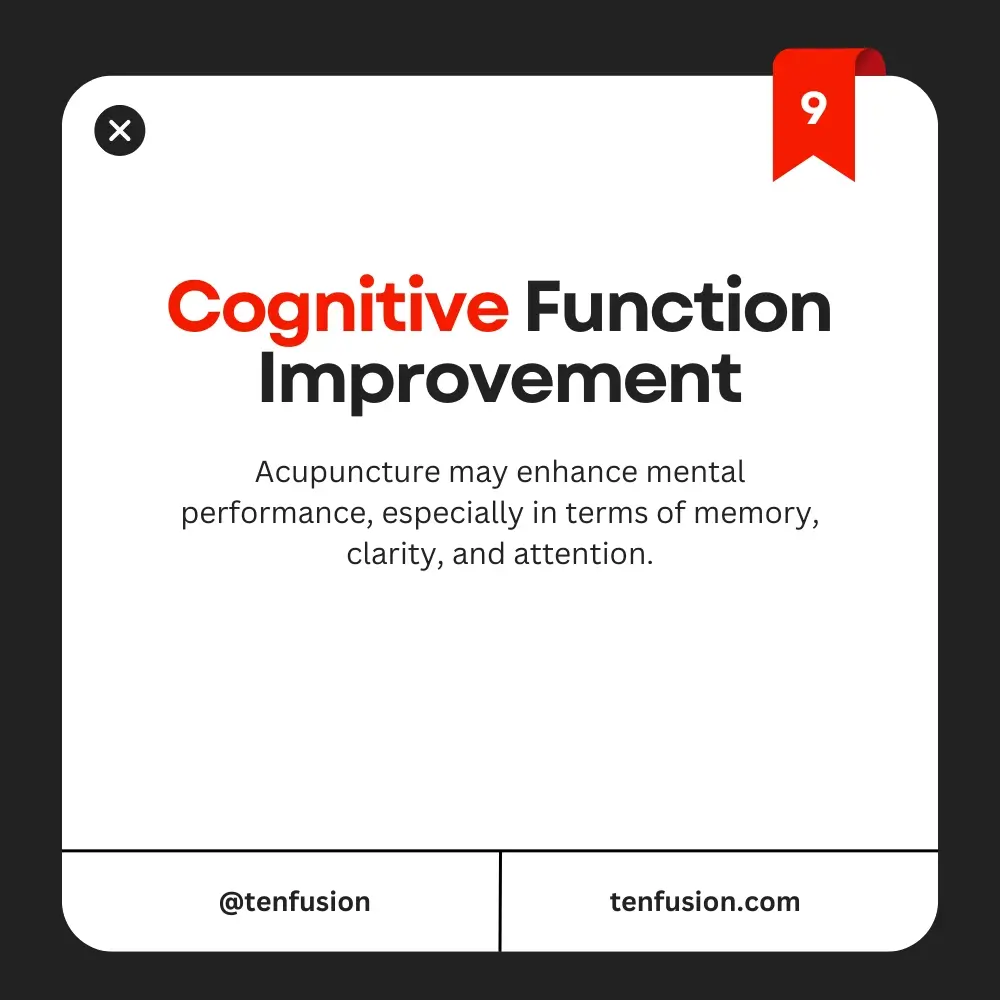
Acupuncture may enhance mental performance, especially in terms of memory, clarity, and attention.
How It Works:
It stimulates brain regions associated with learning, focus, and memory. Improved blood flow and oxygenation to the brain lead to better mental performance. It also helps regulate neurotransmitters involved in attention and cognitive control.
By reducing stress, improving sleep, and boosting energy, acupuncture indirectly clears brain fog and helps with mental sharpness.
Real-World Use:
Helpful for:
- Students and professionals needing better focus
- Elderly individuals with age-related cognitive decline
- Brain fog due to fatigue, stress, or chronic illness
- Support in neurodegenerative conditions (early stages)
Many people use acupuncture proactively to stay mentally agile.
10. Support During Cancer Treatment
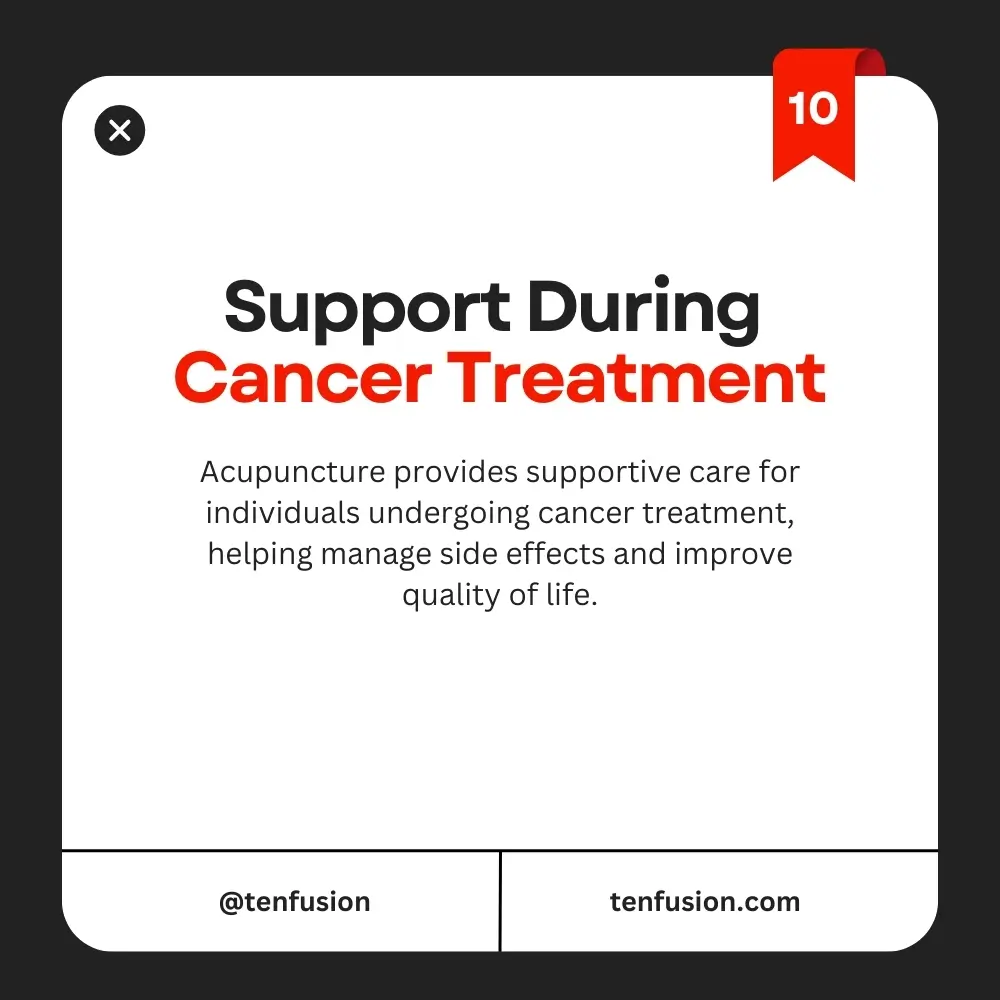
Acupuncture provides supportive care for individuals undergoing cancer treatment, helping manage side effects and improve quality of life.
How It Works:
Cancer treatments like chemotherapy and radiation often cause nausea, vomiting, fatigue, pain, and neuropathy. Acupuncture activates the body’s natural healing processes, reducing these side effects and helping patients tolerate treatments better.
It’s also thought to boost energy, reduce anxiety, and improve appetite.
Real-World Use:
Used alongside conventional cancer care to manage:
- Chemo-induced nausea
- Pain (joint, nerve, muscle)
- Fatigue and sleep disturbances
- Stress and anxiety during treatment
- Immune support during recovery
Many cancer centers now offer acupuncture as part of integrative oncology programs.
Conclusion
Acupuncture offers a holistic approach to health, addressing both physical and emotional well-being. Its integration into modern medicine underscores its effectiveness and versatility. Whether seeking relief from chronic pain, stress, or other health concerns, acupuncture presents a time-tested, natural therapy worth considering.

